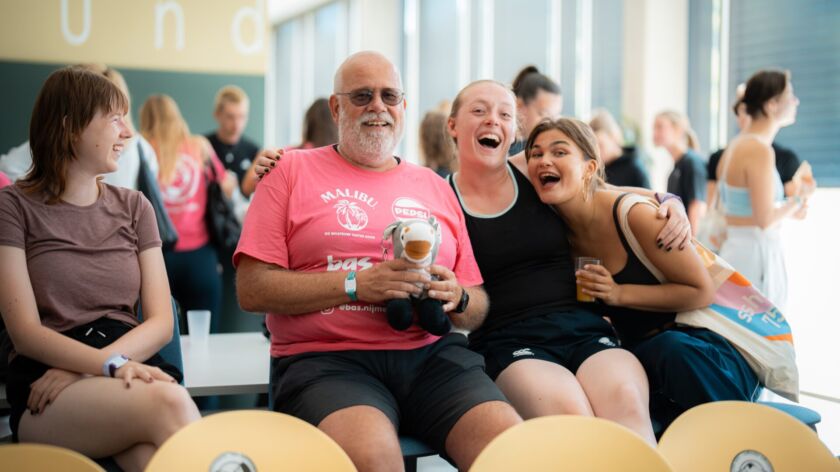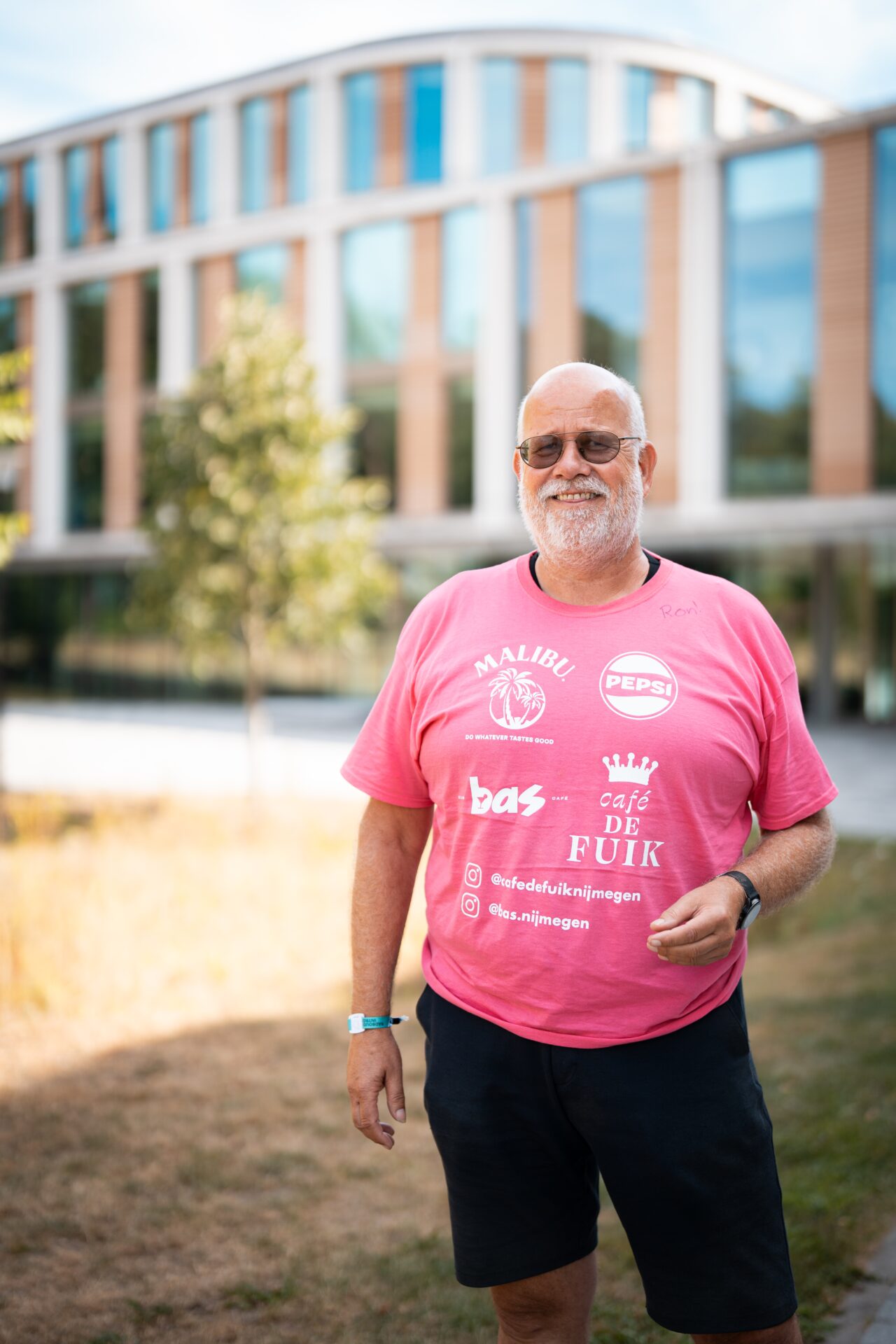Oldest orientation participant Ron is off to study Sociology: ‘I wonder if my brain can still absorb this new information quickly’
-
 Ron van de Zant met mede introplopers in het Maria Montessori gebouw. Foto: Johannes Fiebig
Ron van de Zant met mede introplopers in het Maria Montessori gebouw. Foto: Johannes Fiebig
For part-time retiree Ron van der Zant, no bicycle rides or boat trips, but a full-time study in Sociology. In the course of his long career as an Occupational Health Officer, he has come across some fascinating issues that he is now keen to explore from a sociological perspective. ‘I am doing this mainly out of a personal interest and need.’
‘Clearly, I’m the odd one out,’ says Ron van der Zant, sitting in his pink orientation t-shirt on one of the big stone benches in front of the Maria Montessori building. Van der Zant has spent half his life working as an Occupational Health Officer, but he is also starting a full-time study in Sociology this year. ‘Luckily, everyone is being very kind, enthusiastic, and curious. It feels like a warm welcome,’ he says, laughing.
‘I am two generations older and in a different phase of my life’
At 64, the Nijmegen native stands out among the other orientation particpants, who are some 40 years younger. He is the oldest orientation participant this year. The orientation week is not compulsory, but Van der Zant thought it would be nice if his fellow students already knew him a bit as ‘the odd one out’ before he started his studies.
‘I am two generations older. I’m in a different phase of my life, in which I don’t have to figure out who I am, where I’ll be living, or how I’m going to manage things.’
1979
The Sociology student also sees some similarities between himself and the younger guard. ‘This is a new world for them, but also for me. I will have to ask a lot of questions about things I don’t know, for example when it comes to ICT things like Brightspace or Osiris. In that respect, I’m bound to get stuck at some point. I will need their help and I hope to be able to help them out in other areas. For example, by thinking along with them based on my knowledge and experience.’
At the pub quiz earlier this week, his seniority already came in handy. ‘For example, I knew what the letters N.E.C. stood for (Nijmegen Eendracht Combinatie, Eds.) and what Nijmegen’s oldest shopping street was (Lange Hezelstraat, Eds.).’ He did skip the pub crawl that followed the quiz.
When Van der Zant first studied Medicine in 1979, he also took part in an orientation week at the then Catholic University of Nijmegen. ‘It’s all on a much grander scale now. This kind of market where all the associations and organisations get to introduce themselves, or a festival in Brakkenstein, we didn’t have such things yet.’
When it comes to the study programme, it is precisely the small scale that attracts him. ‘At the Medicine department, there were often 150 of us in a lecture hall. At the Sociology department, there are around 40-50 students. This means you get to know your fellow students and lecturers much faster. It’s a smaller community.’
Absenteeism due to mental health problems
As an Occupational Health Officer at Arbo Unie, Van der Zant supervised employees in the process of getting back to work in a healthy way after a period of absence. He also advised companies on how to prevent long-term absenteeism. Throughout his career, he regularly came across fascinating situations that he would have liked to delve deeper into. Some of these cases he now hopes to explore as a Sociology student.
‘For example, I worked as an Occupational Health Officer for a machine factory and a municipality simultaneously, both of them with around 100 employees. At the machine factory, there was almost no absenteeism due to mental health problems, as opposed to the municipality. I found that very interesting: how can almost 70 percent of absenteeism at that municipality be caused by mental health problems, compared to only 10 percent at the machine factory? Didn’t those factory workers get divorced? Didn’t they experience financial stress or problems with their children? I would like to look at that from a sociological perspective. What could possibly explain this kind of difference?’
No second career
So although Van der Zant is not stressed about finding a room or a job to make ends meet, the brand-new Sociology student is still finding this new step a little scary.
‘In my days as a Medicine student, I thought at the beginning of each term: so many new courses; will I be able to handle it all? I’m experiencing something similar now. In the end, I could do it then, and I will probably manage it now too. But I’m really curious to see whether my brain is able to absorb this new information as quickly as that of the youngsters. Probably not, but hopefully I can compensate with previous knowledge gained here and there.’
‘My son and daughter said: “You will have to work really hard now, Dad”.’
Van der Zant calls the fact that he is getting the chance to study full-time once again an ‘unprecedented luxury’. ‘I always had it in my mind that I wanted to study Sociology after I retired. In the end, I was able to take early retirement, making this wish come true sooner.’ His family is positive about his study plans. ‘My partner Karin likes the fact that I’m studying again and she’s curious to see how I like it. My son David (23) and daughter Lisa (33) smiled (or maybe smirked) and said: “You will have to work really hard now, Dad”.’
Van der Zant still works occasionally as an Occupational Health Officer, but he does not aspire to a second career in Sociology. ‘I am doing this mainly out of a personal interest and need. My two main guiding principles are: Am I enjoying it, and can my brain still handle it? If not, I’ll quit, knowing that I’ve at least given it a try.’




